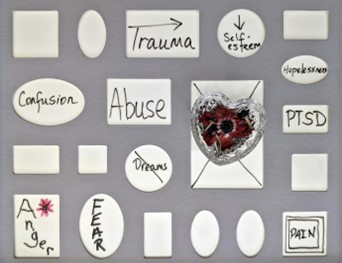In our quest to understand addiction and its unfortunate consequences, we’re often quick to overlook the deeper roots of the issue. We treat it as a simple fact in terms of human behavior. A person with an addiction has an addiction, and that’s that, we say. But what if we told you that beneath the surface lies a story of trauma? Enter trauma-informed care, a revolutionary approach that seeks to heal addiction from its core, where it stems from. It addresses the underlying wounds of trauma rather than just the (obvious) symptoms of addiction. Therefore, this method offers a solid dose of hope for those struggling to break free from the chains of addiction.

What is trauma?
Before we dig deeper into the main subject, let’s define a term we’ll use often today: trauma. According to the definition provided by the APA (American Psychological Association), the main US psychologists’ organization, trauma is how we respond emotionally to horrific events in our surroundings, like accidents, abuse, or loss.
Trauma is more than just shock or denial; it can lead to unpredictable emotions, flashbacks, and strained or broken relationships. While these feelings are somewhat normal among humans, some people might struggle to move forward. Luckily, this shouldn’t be a challenge that’s impossible to overcome: psychologists offer ways to manage these emotions constructively and without judgment.

Experiencing trauma often leads to using substances for coping and eventually forming an addiction.
Relationship between trauma and addiction
The relationship between trauma and addiction is a pretty complex one. While trauma doesn’t directly cause substance abuse, its aftermath can lead to mental health issues like PTSD (post-traumatic stress disorder) or depression symptoms, where substance use often becomes something of a coping mechanism, a means of easing the pain.
Also, it’s not that we’re talking about this without any substantial proof: numerous studies (such as this one) have shown a strong correlation between trauma and substance abuse or dependence. This is especially noticeable when trauma occurs early in life or is recurring.
Symptoms of trauma-related substance abuse
If you’re wondering how to identify trauma-induced substance abuse in yourself or others, look for the following behavioral patterns: prolonged periods spent obtaining the substance or recovering from its negative effects, excessive substance consumption beyond intended limits, and unsuccessful attempts to cut down or control use.
In addition to the symptoms mentioned earlier, there are other signs to watch for. These include craving the substance when not using it, trouble functioning, and continuing to use it despite negative effects. Also, giving up social activities, taking risks, experiencing withdrawal symptoms, or needing more of the substance are all red flags for more serious issues.

One of the symptoms of trauma-related substance abuse is continuous usage that goes beyond intended limits.
Trauma-informed care: treating the root causes of addiction
Now that we’ve covered the basics let’s consider this article’s focal point: trauma-informed care.
What is trauma-informed care (TIC)?
Trauma-informed care (TIC) in the context of substance abuse treatment shifts the focus from identifying problems to understanding and acknowledging experiences; it’s not about what’s wrong with you, it’s rather about what happened to you. It recognizes trauma’s impact and aims to improve care by integrating understanding into policies.
This approach enhances patient engagement, treatment adherence, and health outcomes while promoting wellness for providers and reducing avoidable costs. TIC assumes trauma history in individuals and changes organizational culture to respond respectfully. Also, when service systems don’t use trauma-informed approaches, they can trigger or worsen trauma symptoms, re-traumatizing individuals.
The issue with re-traumatization through treatment
Re-traumatization within substance abuse treatment settings is, or should be, a critical concern. It arises when elements within these environments echo an individual’s past trauma, triggering upsetting reactions. This risk permeates all levels of care and systems. While practices like restraints or isolation are clear triggers, subtler stimuli such as certain smells or sounds can also inadvertently re-traumatize.
Repeated exposure to trauma only intensifies the symptoms and reduces treatment engagement. Furthermore, interactions with individuals carrying historical, inter-generational, or cultural trauma can amplify this risk within substance abuse treatment contexts. Therefore, personalized, trauma-informed care is the best way to battle both substance abuse and its underlying causes.
Additional benefits of trauma-informed care
Trauma-informed care extends beyond patient care to also encompass providers and staff members. Individuals dealing with co-occurring disorders such as trauma and substance abuse issues usually have a hard time establishing and maintaining healthy relationships with healthcare providers. However, trauma-informed care promotes better patient engagement; it nurtures trust and rapport between patients and providers. This kind of approach, in turn, contributes to improved long-term health outcomes for patients. Additionally, by prioritizing sensitivity to trauma, this approach can prevent the appearance of burnout symptoms among healthcare providers.
Overcoming denial: the first step towards recovery
Out of the many psychological stages of recovery, denial marks the beginning; it is the initial phase. It’s a common response to the stress and challenges of (trauma-related) substance addiction, as individuals might feel like they’re on top of the situation or underestimate the seriousness of their condition.
Whether conscious or unconscious, recognizing and overcoming denial is crucial. Professionals can offer support in this process, as seen in substance abuse intervention cases. The sooner one acknowledges and addresses denial, the smoother the path to recovery becomes. This will also allow treatment methods to be more effectively employed.

Overcoming denial is the first step towards recovery.
How you can help
In order to prevent a loved one from using substances to cope with past trauma, there are many things we can do to ease their pain. For instance, we can listen without judging or making assumptions; sometimes, lending an empathetic ear is enough to help someone. Also, we can try not to make every conversation about the unfortunate experience they’ve endured. Offering practical support (such as assisting them to find appropriate care providers or learn more about their condition) can also be beneficial.
Conclusion
To summarize, trauma-informed care (TIC) offers hope for people battling the consequences of trauma and substance addiction. This approach shifts the attention from “What’s wrong with you?” to “What happened to you?” and prioritizes understanding and compassion. Also, it empowers patients to engage more fully in their road to recovery while supporting providers and staff in delivering effective, sensitive care. Together, we can create healing environments that promote resilience and recovery for all individuals affected by trauma.
Meta description: Explore the concept of trauma-informed care and find out how this method is reshaping the world of addiction treatment.
Keyword:
trauma-informed care
Images:
https://unsplash.com/photos/a-woman-rests-her-head-on-another-persons-shoulder-KQfxVDHGCUg
https://unsplash.com/photos/happy-new-year-greeting-card-EDJKEXFbzHA
https://unsplash.com/photos/creepy-blurred-photo-of-a-persons-face-and-a-furry-hood-pTUCMqXCOrk
References:
https://www.apa.org/topics/trauma
https://www.verywellmind.com/connection-trauma-and-substance-abuse-7269368





